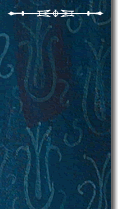


 |
 |
|
Letters :: Page 1
Jump to Page >1< : 2
: 3 of Letters
Raves...
Alternative rock bands? Political comix replete with four-letter
words? Ahh, Obie, your tradition is still alive! Sounds like our recent
alums and my late ’60s contemporaries have a lot in common.
Richard Zitrin ’68
San Francisco, Calif.
Finally! An Oberlin Alumni Magazine issue that
I feel in part represents me! Thanks for including David Rees and the
Oberlin rocks article. It was very important to me that
anti-national political opinion was expressed in a few places. Most Obies
were probably against the war for some time. Yes?
Patricia Neighbor ’99
Portland, Ore.
The piece on David Rees in the spring issue was wonderful.
It reminds me a little of the old Mummers shows back in ’42. It
was hilarious, irreverent, mordantly scatological, and just what the country
needs right now. It is wonderful to know that Oberlin is still Oberlin
(under God, of course) and makes me proud to say, “That’s
where I went to
college, and that’s why I went there.”
James K. Sunshine ’49
Tiverton, R.I.
It’s great that New York City’s foaming rock
scene is packed with Obies, but the article omitted some of the key Obies
in the 1990s who led the way. Vivian Trimble ’85 was the keyboard
player in Luscious Jackson, a great New York band in the mid ’90s.
I recall bumping into Vivian when she was doing a record signing at a
hard-core music store in Atlanta around 1995. And Dan Zanes, who I knew
in my first year at Oberlin in 1980-81, led the Del Fuegos and other bands
in the 1980s and ’90s. Both are listed in the Ultimate Band List
at www.ubl.com.
Josh Gonze ’84
Santa Fe, N.M.
::::
...and Rants
I mean, even The New Yorker prints the f-word.
As interesting as I found your story on David Rees, I think that journalistic
integrity would demand that you not run the story unless you can give
full respect to the sensibility that your subject brings to his art, including
the vernacular that he chooses to represent that sensibility.
Richard Blumberg ’58
Cincinnati, Ohio
The picture on the last cover emphasizes everything second-rate
about rock and roll—the messiness, noise, and ugliness. This is
not the Oberlin I knew when I returned for five years from 1985 through
1990. The Conservatory was better than ever, with more exceptional students
studying the great composers and play-ing their works with respect and
expertise. The editor grants a few inches to Robert Spano ’83 conducting
the Boston Symphony Orchestra and six pages to the rock bands originating
in Oberlin and making a hit in New York City. Which is more interesting
to more alums? Please, do not let Oberlin be degraded in this way.
Dorothy Reavy Shibley ’35
Englewood, Colo.
I have always been proud that I earned my degree from
the Conservatory in the department of music education. Even though New
York City thinks that Oberlin rocks, the spring cover was a poor image
of such a prestigious music school as Oberlin. I was pleased, however,
that the excellent review of the book Invasion was included, so all was
not lost.
Shirley Mooney Sherwood ’43
Englewood, Colo.
::::
Required Reading
I was pleased to see the detailed and fair-minded review
of Invasion by Michelle Malkin ’92 in the spring issue. This book
is indeed essential reading, as the reviewer states. Malkin must be the
most noteworthy journalist Oberlin has produced in decades, and it is
good that this review of her book will bring it to the attention of alumni.
Roland Hirsch ’61
Germantown, Md.
::::
Continuing The Legacy
Thanks for the story “Family Tree, Oberlin Roots”
in the spring issue. At your invitation, I’d like to note my family’s
Oberlin ties, which date to 1918. In that year, my uncle Samuel Esseks
arrived in Oberlin with three friends by train from Brooklyn, New York.
The son of Russian Jewish immigrants, he was steered to Oberlin by a high-school
teacher. While pursuing his studies, he played basketball, worked in a
tailor shop, helped to found the Menorah Society, and met his future wife,
Wilma Dixon Esseks. Three of their four children—Janice ’47,
William ’56, and John ’60— graduated from Oberlin, as
did their nephew, Allan Shepp ’48, and granddaughter, Hope Keller
’79. While I grew up surrounded by Oberlin cousins and cousins-by-marriage,
my closest Oberlin inspiration was my brother, Robert Tittler ’64.
Ten years my senior, he introduced me to such Obie traditions as Gilbert
and Sullivan (via Highfield, where my future sister-in-law, Anne Tittler
Kelso ’64, performed), mock conventions, co-ops, and a stream of
fascinating students who visited our New York home during vacations. While
still in grade school, I received a strong awareness of social issues
through his Oberlin activities, which included teaching an elderly gentleman
to read. I attended Oberlin 10 years later, in a very different era. Civil-rights
marches and mock conventions gave way to antiwar demonstrations and growing
ecological awareness. As I had hoped, I found the Oberlin concern for
social justice strong and active, and the academic climate challenging
and nurturing. Although I do not know what events will shape her Oberlin
experience, I am proud that my daughter, Emily Feingold ’07, will
deepen our Oberlin roots. She first set foot on campus at my 25th reunion
in 1999 and found the blend of alumni memories and future musical and
liberal arts possibilities intoxicating. As she made her way through high
school with her Oberlin enthusiasm blazing, I insisted that she discover
Oberlin for herself, rather than solely as a reflection of family tradition.
When my husband and I accom- panied her last September to interview and
stay overnight with a host student, she turned to me in front of the art
museum and declared, “Mom, I feel as if I already go here!”
Proof enough! Continuing the tradition, we will see you in the fall.
Nancy Tittler ’74
Binghamton, N.Y.
![]()